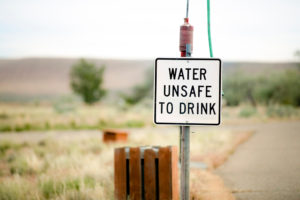
The average American family uses more than 300 gallons of water every day. Whether you’re showering, brushing your teeth, or pouring yourself a glass because you’re thirsty, you assume that your water supply is safe. For more than 30 years, over a million people who lived at Camp Lejeune in North Carolina believed their water was fine. Unfortunately, they were wrong. Water at the military base was tainted with volatile organic chemicals (VOCs) that aren’t recommended for human consumption. These chemicals effectively poisoned the water, spreading it through the water treatment plants, leaving many of those who consumed it with long-term, irreversible health damage. Contamination began in 1953, and the water wells weren’t shut down until the 1980s. Thanks to a new law signed by President Biden on August 10, 2022, water contamination victims can now file Camp Lejeune claims against the federal government.
The water contamination fiasco didn’t have a singular cause, and multiple things went wrong at Camp Lejeune. One source was a dry cleaner with improper storage practices. Another factor was leaky underground storage tanks. The main chemicals that tainted the Camp Lejeune water supply are tetrachloroethylene (PCE), trichloroethylene (TCE), benzene, and vinyl chloride. Tests revealed that these contaminants were present at levels so much higher than what is recommended for human exposure. In the decades since the military closed the water plants, reports have revealed that officials knew about the contamination while the water wells were operational and military personnel and family members were living on the base.
The chemicals found in the Camp Lejeune water cause damage to the human body in different ways. Benzene is one of the most commonly used chemicals in the U.S. Still, long-term exposure causes a decrease in red blood cells and can negatively affect the bone marrow. PCE is a dry cleaning chemical and metal degreasing solvent designated by the EPA as likely carcinogenic. It can impair the central nervous system and cause organ damage. Vinyl chloride is used in manufacturing and is associated with various cancers. And TCE, an industrial solvent, has been linked to multiple severe health conditions.
The Agency for Toxic Substances and Disease Registry (ATSDR) examined multiple studies on Camp Lejeune and other studies on toxic exposure to assess possible side effects. Below are some of the most common illnesses Camp Lejeune victims suffer from after toxic water exposure.
Cancer
There are several contributing causes to a cancer diagnosis. Environment, genetics, and lifestyle choices usually play a role in someone developing the disease. Doctors have noticed concerning patterns in those living at Camp Lejeune who ingested the poisoned water. The Camp Lejeune chemicals have been associated with the below cancers, which means that those exposed may be more likely to get sick.
- Kidney cancer
- Non-Hodgkin’s lymphoma
- Bladder cancer
- Leukemia
- Liver cancer
- Multiple myeloma
- Breast cancer
- Cervical cancer
- Esophageal cancer
- Lung cancer
- Ovarian cancer
- Prostate cancer
- Rectal cancer
- Brain cancer
- Soft tissue cancer
Myelodysplastic Syndromes
Myelodysplastic syndromes (MDS) are a group of blood cell disorders associated with benzene exposure. Also known as preleukemia, these diseases cause abnormal blood cell function. MDS patients are at higher risk of developing leukemia and have a shorter lifespan than people without the condition. Aplastic anemia is a rare myelodysplastic syndrome linked to benzene. The condition results when the body cannot produce enough bone marrow cells, causing symptoms like fatigue, unexpected bruising, bleeding, and an increased risk of infection.
Parkinson’s Disease
Parkinson’s disease is a brain disorder characterized by nerve cell degeneration. There is no known cure, and most Parkinson’s patients will suffer a significant disability within ten years of diagnosis. Parkinson’s disease is characterized by tremors, slowness, trouble walking, and mental health problems, and it is a debilitating condition. In the end stages of Parkinson’s disease, patients cannot care for themselves without help. Research has linked TCE exposure to Parkinson’s as well as to tremors.
Pregnancy Complications
Women who suffered miscarriages or carried pregnancies to full term face even more risks from toxic exposure if they were pregnant while living on base. The Camp Lejeune contaminants are associated with pregnancy and birth complications. Benzene, TCE, and PCE can increase the risk of miscarriage and fetal death. The latter two chemicals are associated with birth abnormalities. Pregnant women exposed to toxic chemicals have a higher chance of birthing babies with eye defects, neural tube defects, cleft lip conditions, and low birth weight.
Camp Lejeune Water Contamination Legal Options
Were you stationed at Camp Lejeune when chemicals contaminated the water supply? If you lived or worked at Camp Lejeune for 30 or more days between August 1, 1953, and December 31, 1987, and now have health problems that you think could be related to toxic exposure, it’s crucial to hire a Camp Lejeune water contamination lawyer who understands the new Camp Lejeune Justice Act. An experienced attorney can help determine how much compensation you should seek and assist with the claims process.
The process begins by filing a Camp Lejeune claim for injuries or wrongful death with the Office of the Judge Advocate General (JAG) of the Navy’s Tort Claims Unit. If the claim is denied or isn’t settled, victims can file a civil lawsuit with the U.S. District Court for the Eastern District of North Carolina after 6 months have passed since filing the claim with JAG. You can still file a Camp Lejeune claim if you receive disability benefits and support from the VA. You must file a claim within two years of the signing date of the Camp Lejeune Justice Act, so it’s essential to act fast. Schedule a free initial consultation with Murray & Murray to discuss your situation. Our team will help determine whether you have a case. Contact us online or call us today at 800-624-3009.

Partner at Murray & Murray Co., L.P.A.














Comments for this article are closed.